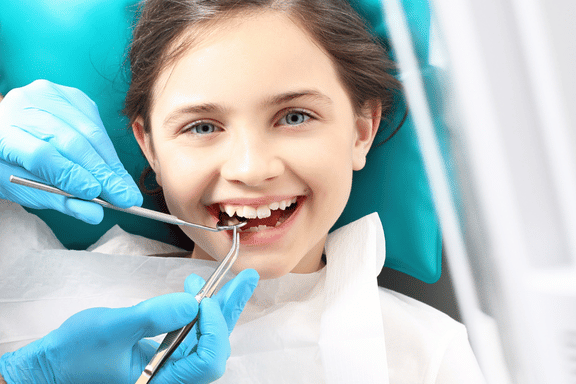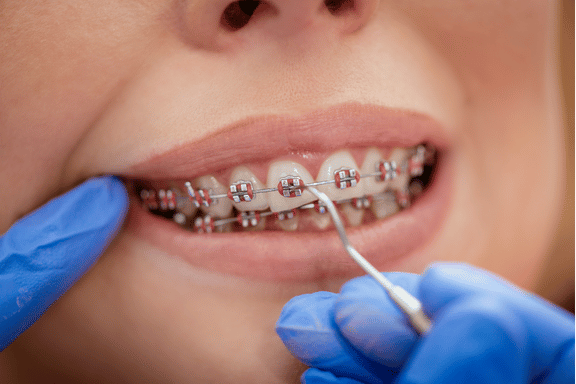
When you’re considering braces for your child, one of the first questions that might come to mind is, “Do braces hurt?”
This is a natural concern for parents, especially when you’re thinking about the comfort and well-being of your child. While braces are a fantastic tool for creating a beautiful, healthy smile, it’s normal to wonder about the discomfort they might bring.
At Impact Orthodontics in Calgary, AB, we want to answer this question honestly, while also showing you how manageable the process is.
In this blog, we’ll discuss everything about braces—why you might choose this orthodontic treatment, what to expect when it comes to discomfort, and effective ways to relieve braces pain.
So, let’s dive into the big question: do braces hurt?
Why Consider Braces? Do Braces Hurt?
Before we get into whether braces hurt, let’s talk about why you might consider orthodontic treatment for your child.
Orthodontic treatment typically begins between the ages of 8 and 14 years, which is when issues like abnormal bites become apparent.
Braces help correct common dental issues like overcrowded or crooked teeth, abnormal bites, and alignment problems. These issues not only affect your child’s appearance but can also lead to long-term oral health problems such as tooth decay and gum disease. Orthodontic treatments like braces gradually align teeth and jaws, improving both function and aesthetics.
While the initial placement of braces might cause mild discomfort, the overall benefits are well worth the effort. Straight teeth can prevent future oral health issues and give your child the confidence to smile proudly.
Do Braces Hurt When First Applied?
When getting braces, the first step is the placement of metal brackets on the teeth. Your orthodontist mounts brackets using a strong adhesive, and these brackets are connected by wires that slowly pull the teeth into their proper position. The question, “Do braces hurt when they’re first applied?” is a common one. The answer: there might be mild discomfort, but it’s typically not painful.
During the initial few hours after the braces are placed, your child might feel a slight tightness or discomfort as their mouth adjusts. This discomfort is caused by the gentle pressure the braces apply to slowly move the teeth into alignment. This sensation is temporary and usually subsides within a few days.
Encourage your child to eat soft foods like yogurt, mashed potatoes, or smoothies during the first few days to reduce discomfort from chewing.
Do Braces Hurt After Adjustments?
Now, what about after brace tightening? This is another phase of orthodontic treatment that can bring about some discomfort. Every 4-8 weeks, your orthodontist tightens the wires and adds elastic bands, if necessary, to continue guiding the teeth into place. This process is essential for ensuring the braces do their job, but it often causes mild to moderate discomfort that can last for a few days after each adjustment. While some may experience moderate discomfort, others may feel only mild discomfort that typically resolves within a few hours.
The discomfort from brace tightening is usually felt as a dull ache or a slight soreness, especially when chewing food. However, this is a good sign that the braces are working to align the teeth properly!
How Long Do Braces Hurt? Managing Mild to Moderate Discomfort
Parents often wonder, “How long do braces hurt?” The truth is that most discomfort occurs shortly after the braces are first applied or tightened, and it typically lasts only a few days. The mild discomfort subsides as the body adjusts to the gentle pressure from the braces.
Various pain relief methods, such as over-the-counter medications like ibuprofen or acetaminophen, as well as cold compresses, can help manage this discomfort effectively.
It’s worth noting that the pain is rarely severe. Most children experience soreness rather than actual pain, and this soreness usually goes away as their mouth adapts to the new pressure. If pain persists beyond a few days or seems particularly intense, it’s a good idea to contact your orthodontist for advice.
What Causes Discomfort? Addressing Sore Gums and Metal Brackets
It’s not just the movement of teeth that can cause discomfort. The metal brackets rubbing against the soft tissues of the mouth, like the cheeks and gums, can create sores or irritations. This rubbing might make your child’s mouth feel sore in spots, particularly in the first few weeks of wearing braces. Fortunately, this is easy to manage with orthodontic wax.
Orthodontic wax is a soft, pliable material that can be applied to the brackets and wires, providing a smooth barrier between the metal and your child’s gums. This reduces irritation and allows the sores to heal more quickly.
Always keep orthodontic wax handy, especially in the early stages of wearing braces. Applying it to any part of the braces that feels rough can prevent sore gums and scrapes.
Practical Tips for Relieving Braces Pain: Easy, At-Home Solutions
So, what can you do to relieve braces pain at home? Here are a few tried-and-true methods to help you stop braces pain and make your child feel more comfortable during the treatment process:
- Over-the-counter pain relievers: These can reduce both discomfort and inflammation.
- Orthodontic wax: As mentioned earlier, it’s a simple but effective way to stop braces from rubbing against gums and cheeks.
- Cold foods and drinks: Ice cream, smoothies, and cold water can help numb the mouth and reduce inflammation. Plus, kids love them!
- Soft foods: When the braces feel particularly tight, soft foods like soups, scrambled eggs, and pasta are easier to eat.
- Good oral hygiene: Keeping the mouth clean with regular brushing and flossing can help prevent sores and infections, which can create pain.
Encourage your child to avoid sugary foods, as they can get caught in the braces and increase the risk of tooth decay. A clean mouth is a happy mouth!
When Braces Cause More Than Just Discomfort: Signs to Watch For
While it’s rare, there are times when the discomfort from braces crosses into actual pain. If your child complains of severe pain that lasts longer than a few days, or if they develop persistent sores, it could be a sign that something’s wrong. In these cases, it’s important to visit your orthodontist for an adjustment.
Removing Braces: What to Expect and Does It Hurt?
One of the most exciting days in your child’s orthodontic journey is the day they get their braces removed! After all the months (or years) of wearing braces, the removal process is quick and painless. Most patients experience only minor discomfort during removal, as the brackets are carefully popped off the teeth.
Following removal, your orthodontist will clean the teeth to remove any residual glue and may fit your child with a removable retainer to keep their teeth in place. Your child might feel their teeth are slightly sore after the braces are removed, but this should fade quickly.
Be sure your child wears their retainer as directed to maintain their new, beautiful smile!
Conclusion: Do Braces Hurt? The Answer is Manageable
So, do braces hurt? The simple answer is that while there may be moments of mild discomfort or soreness, the pain is minimal and manageable. Most children adjust quickly to the feeling of wearing braces, and the discomfort is a small price to pay for a lifetime of healthy, straight teeth.
At Impact Orthodontics, serving SE and SW Calgary and surrounding communities, we are dedicated to making the orthodontic journey as comfortable and successful as possible. Contact us today!
By following the tips in this blog, you can help your child navigate their orthodontic treatment with confidence and ease.
Remember, a little bit of discomfort today can lead to a brighter, healthier smile tomorrow! Let’s work together to make that happen.












